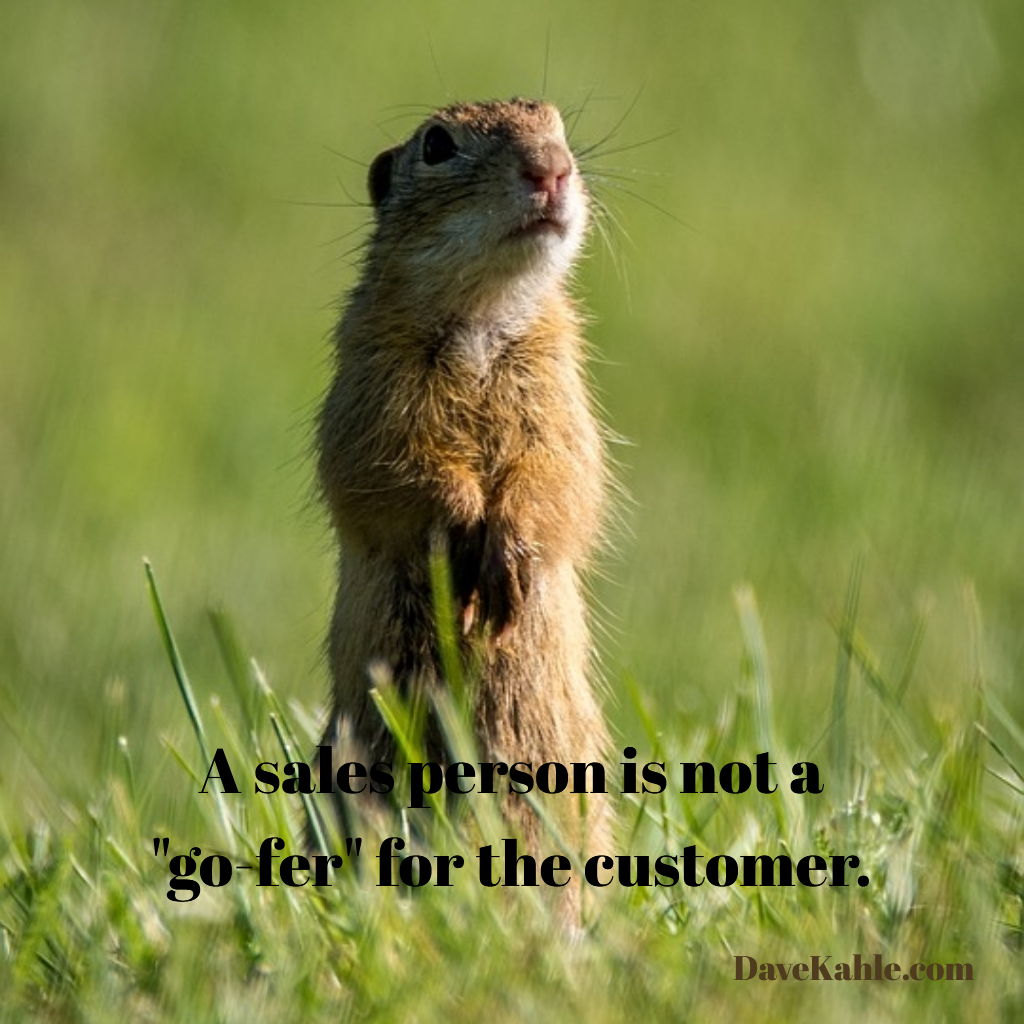Ideas that hinder sales performance: All customer contact must go through me
by Dave Kahle
It’s a common mindset. The field sales person wants every communication with the customer to go through him/her. In other words, instead of calling customer service with a problem, the customers are instructed to call the sales person first. Instead of calling technical service for a repair issue, call the sales person. Need a price? Don’t call inside sales, call the sales person.
It’s easy to see why so many sales people adhere to this idea. It makes them feel important – look at all the phone calls they receive. It puts them into more regular contact with the customer, hopefully providing opportunity for enriching the relationship. And, since the sales person is, in effect, providing some service to the customer, the sales person believes that he is bringing value to the customer, and that the customer will come to rely on the sales person.
At one level, all of that sounds good. However, that idea costs both the company and the sales person dearly, and frustrates the customers. It is an insidious hindrance to sales performance.
Here’s why. First, it fills the sales person’s day with needless administrative tasks that can be done better and cheaper by someone else inside the company. Here’s an example. The customer received ten line items on their last shipment, and one of them is not the item they ordered. In the “everything most go through me” scenario, the customer calls the sales person, who interrupts a visit with another customer to take the call. He tells the customer he’ll get back to him. Then he calls customer service and makes arrangements to handle the problem. Next he calls the customer, and gets his voice mail. The sales person leaves a message for the customer to call him. The customer does, but, alas, gets the sales person’s voice mail. The cycle repeats until live contact is made, and the sales person conveys the message.
The net impact is to increase the frustration on the part of the customer, to add costs to the selling company, and to weigh the sales person down with needless tasks. This kind of thing happens multiple times every day.
Look how much time the sales person wasted. He really didn’t need to be a part of any of this. If the customer would have called customer service directly, the problem would have been handled immediately – saving the customer and the sales person lots of time. The customer service rep is far better (and cheaper) at responding to service issues than is the sales person.
The culmination of hundreds of these kinds of scenarios, played over time, combine into a huge cost to the company. Not only is the selling company using an expensive asset (the sales person’s time) to accomplish a task that is more efficiently done by a less expensive asset (the customer service rep), but the opportunity costs are even larger. While the sales person was spending his time on the phone in this needless set of tasks, he wasn’t calling on another customer. In other words, the sales person made the choice to involve himself in this administrative clutter rather than use the time to sell something. Add those costs up, and the numbers will keep you awake at night.
But an even more insidious effect has to do with the message you are sending to the customer. What is the implication of “call me for everything” on the customer? He perceives that there are no competent people working for your company other than the sales person. Why else would you need to call him first? There must not be any infrastructure to take care of customers — no systems to handle these kinds of issues.
If the only person you can talk to is the sales person, then there must not be much of a company supporting him. Why would you want to do business with a company like that?
The real culprit in this very common situation is the errant mindset of the sales person relative to how he/she sees his job. It’s the fundamental answer to this question: “How does a sales person do his job?”
The world is full of distributor sales people who think the answer is to become a mobile customer service rep. Their job, so they believe, is to be a super-responsive “go-fer” for the customer — have every communication come through the sales person, respond to every whim of the customer, solve every problem.
This “mobile-customer-service-rep syndrome” lives at a deeper level in the sales person psyche and in the culture of the company that employs him. In our Top Gun Seminars for Distributor Salespeople, we identify it as the entry-level sales mindset, but one from which most sales people never progress.
This approach, of course, fills the sales person’s day with “stuff”, and makes him feel busy and important. Unfortunately, it leaves little time for the nuts and bolts of selling – proactively uncovering the customer’s deeper needs, presenting products, services and programs that help him grow his business and do his job better.
The symptoms of this syndrome pop up all over the place. Sales people who make sales calls with nothing to sell. Sales people who rarely make cold calls on prospects they don’t know. Sales people who spend their days on the cell phone, making needless calls for things that rightly should be done by others.
As long as the sales person is burdened by the mobile customer service rep mentality, and as long as the company’s culture supports that mindset, the sales people will never grow to reach their potential, and the company will be forever burdened by the costs of ineffective sales efforts.
Copyright MMIX
Originally published on davekahle.com
About the Author:
Dave Kahle is one of the world’s leading sales authorities. He’s written ten books, presented in 47 states and ten countries, and has helped enrich tens of thousands of sales people and transform hundreds of sales organizations. For more insight, register for the Kahle Way Sales Management System seminar (November 30 – December 1, 2017). Learn a profoundly simple and practical sales management system proven to increase sales productivity and accelerate your growth. For more information use this link:
http://davekahle.com/wordpressblogs/the-kahle-way-sales-management-system-seminar/
source http://www.commence.com/blog/2017/11/22/customer-contact-must-go-through-me/



No comments:
Post a Comment